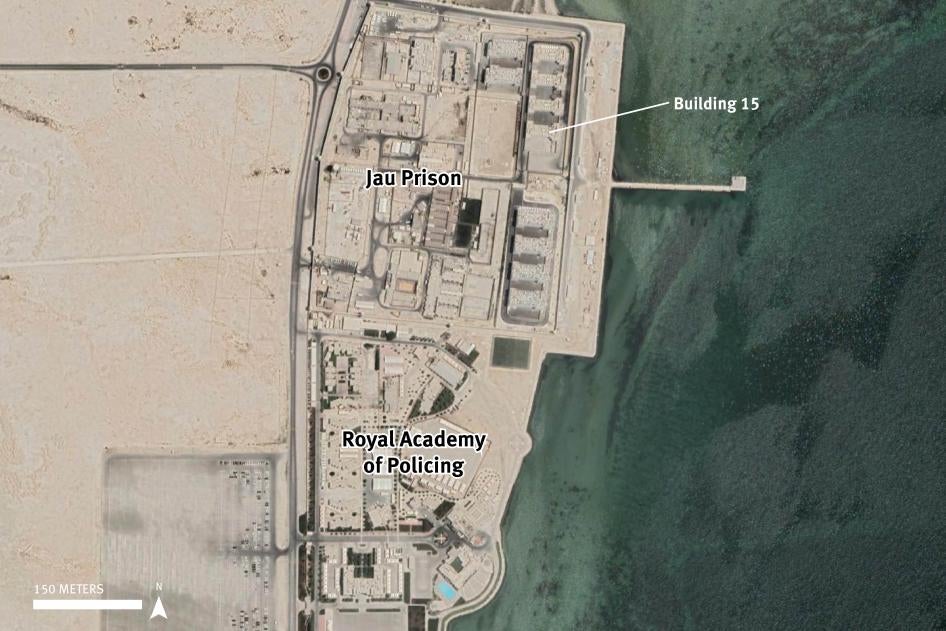Bahrain should take urgent steps to address the grievances of hundreds of prisoners now on hunger strike and ensure that prisoners are treated humanely, as required under international law, Human Rights Watch said today. The authorities should also release anyone serving a prison term solely for exercising their right to freedom of expression and peaceful assembly, starting with prominent human rights defenders Abdulhadi al-Khawaja and Abduljalil al-Singace.
More than 400 inmates in Jau prison, the country's largest prison, initiated a hunger strike on August 7, 2023, to protest abysmal detention conditions and denial of health care. According to the Bahrain Institute for Rights and Democracy, as of August 30, more than 800 were on the hunger strike.
"Many of the inmates on hunger strike in Jau prison are being held after grossly unfair trials and have experienced years of abuse in custody," said Niku Jafarnia, Bahrain and Yemen researcher at Human Rights Watch. "Bahraini authorities need to ensure humane detention conditions and immediately release those unjustly imprisoned."
Many of those on hunger strike are being held unjustly following trials plagued with rights violations. A number of prisoners told the Bahrain Institute for Rights and Democracy on August 21, that prison authorities continue to subject inmates to inhumane treatment and deny them access to adequate health care.
Prisoners at Jau in some cases are being forced to spend 23 hours a day in their cells. Inmates are calling for an end to prolonged solitary confinement, more than one hour daily outside of their cells in the prison yard, prayer in congregation at the prison mosque, family visits without glass barriers, and needed access to health care. Prisoners, including al-Khawaja and al-Singace, have said that prison authorities refuse to refer them to specialists and deny them access to essential medicines.
Al-Khawaja is co-founder of the Gulf Center for Human Rights and the Bahrain Center for Human Rights and has Danish citizenship. He was arrested in 2011 for his role in pro-democracy protests in Bahrain and is serving a life sentence handed down following a grossly unfair trial.
He has been on an only-water hunger strike since August 9 to demand access to specialist medical care, his daughter Maryam al-Khawaja, told Human Rights Watch. In his 12 years of imprisonment, al-Khawaja has been subjected to severe physical, sexual, and psychological torture. Bahraini authorities have repeatedly denied al-Khawaja essential health care, despite his life-threatening cardiac problems.
His health has drastically worsened in the last few months, his daughter said. An independent doctor consulting for the family who is knowledgeable about al-Khawaja's case said that he may not survive for more than a few days given his deteriorating condition, chronic health issues, and the potential for sudden, fatal cardiac arrest.
Al-Singace, a Bahraini academic and human rights defender, is also serving a life sentence for his role in the 2011 protests. He has been on a hunger strike without solid food since July 8, 2021, protesting the confiscation of his handwritten book notes by prison authorities. Al-Singace has been suffering from diminished eyesight, arthritis in his shoulder joints, tremors, and prostate problems. Dr. al-Singace has been held in solitary confinement and denied access to adequate medical treatment.
Bahrain's Independent Ombudsman's Office claimed on August 10 that it had opened an investigation into the conditions that led up to the hunger strike. The Ombudsman's Office said that inmates in isolation have committed "serious violations" that warrant "administrative measures to reclassify them."
On August 28, the Interior Ministry issued a statement saying that it is "engaging in discussions" around providing health care and education services, reviewing visitation regulations, extending outdoor time in the prison yard, and reviewing charges for phone calls.
Bahraini authorities have an obligation under international law to treat all detainees humanely. Article 10 of the International Covenant of on Civil and Political Rights requires authorities to treat all prisoners with humanity and respect for the inherent dignity of the human person. The United Nations Standard Minimum Rules for the Treatment of Prisoners (Mandela Rules) require prisons to make specialized treatment available or refer prisoners who require specialized treatment to the relevant facilities.
"The international community, and especially states with close ties with Bahrain, should use their diplomatic standing to press Bahraini authorities to end their abusive treatment of prisoners," Jafarnia said. "Other countries should not simply remain silent when over 800 prisoners in Bahrain, many of whom should never have been in prison to begin with, have put their lives on the line."








